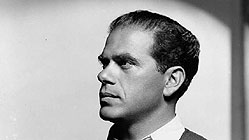|
|
|
|
Mr Capra Goes to Heaven |
 |
|
Frank
Capra is one of the most eternally present of all
Capra
was a showman and a populist of the cinema. Few filmmakers have taken on the
mythic cause of
Capra is
loved by virtually all film fans and serious film lovers, even if the latter group have not always known what to say in-depth about his
movies. He is in a tradition of
Capra’s
greatest years as a filmmaker were in the 1930s. Even before he hit stride with
wildly popular hits like Mr Smith,
the string of films he made at the beginning of that decade – Miracle Woman (1931), Platinum Blonde (1931), American Madness (1932), The Bitter Tea of General Yen (1933) – make for startling, inexhaustible viewing today. What makes Capra memorable is
not only the vital expression of an American Dream, but also what critics
including David Thomson and Robin Wood have called the worrying of that dream, the explicit dramatisation of its deepest
tensions, contradictions and fears.
Take It’s a Wonderful Life which, at one
level, is quite simply the biggest, most persuasive apology for the status quo
ever produced by mass culture. Post-war Everyman George Bailey (Stewart) comes
to doubt his lot in life as a modest father and provider, so Capra goes into
bat trying to convince him – and us – that sticking with normality is worth it,
after all. To this end, Capra pulls out of the hat not only a guardian angel,
but finally a veritable vision of Hell – what the world would be like if George
had never been born. Yet, for any of this persuasion to work, Capra must first
concede a little – a dangerously tantalising inch, indeed – to the opposite
side of the argument: the terrible thought that, in accepting home and family
and small town, George has unnecessarily sacrificed ambition, libido, romance
and adventure – those opposite, anti-social American dreams which
The last
word goes to a director who died two years previously (even though his career
began just as Capra’s was winding up); someone who, in his own extraordinary
way, consciously reinvented Capra’s cinema. I’m referring to John Cassavetes,
who regarded Capra as “the greatest filmmaker who ever lived”, while admitting:
"I wish I could really express the beautiful ideas he could without
feeling perhaps that these ideas are not truthful”. That’s a reflection that
goes right to the heart of the ambiguous richness of Capra’s films.
But
Cassavetes’ finest thought on his hero was also his most succinct: "Maybe
there never was an
Broadcast as an obituary tribute on
the Australian radio program Screen, 5 September
1991.
© Adrian
Martin 5/9/91, 6-8am
|
![]()